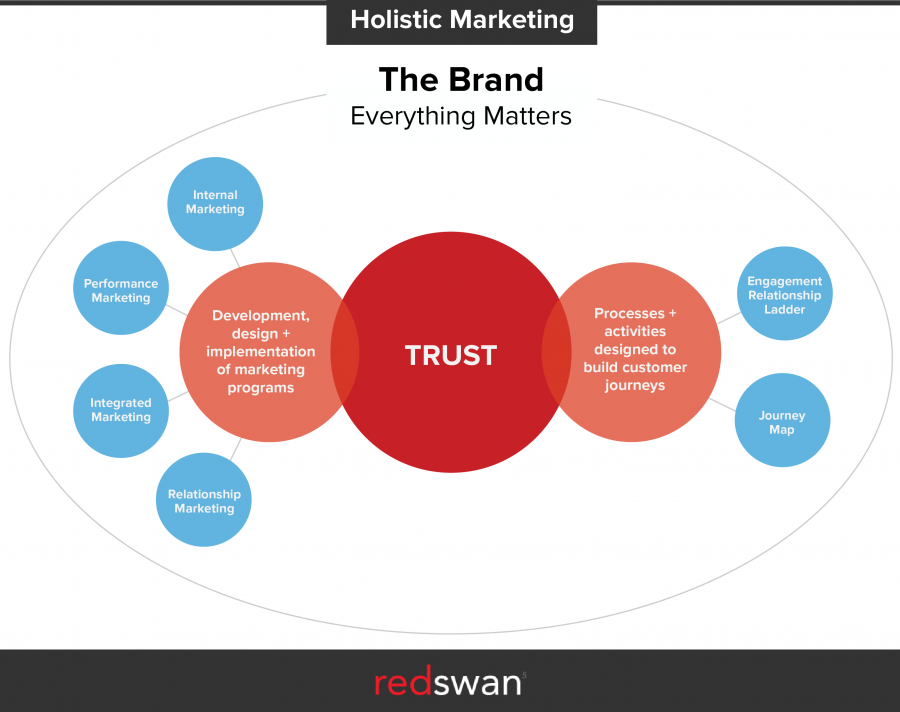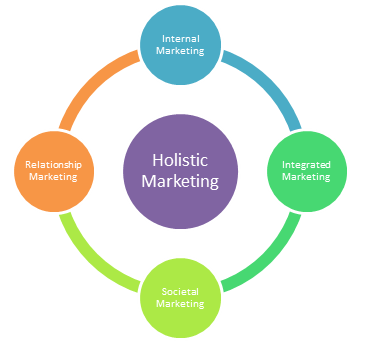
Redefining Holistic Marketing: Does Everything Matter?
Standing in front of my Bentley MBA marketing class filled with hopeful, smart analytical marketers, I try to explain how the branding process and integrated marketing communication are related. I thought using a case study that documents the deep, difficult process firms go through to adopt a strong branding foundation by addressing their internal culture would demonstrate the messy, enmeshed process of holistic marketing. I am met with facial expressions that range from slightly bemused to full on “Orange is the New Black’ Crazy Eyes. I am not believed.
On Management Mania, the brilliant Philip Kotler and Kevin Lane Keller offer a sound academic definition of holistic marketing, “ Holistic marketing recognizes that ‘everything matters’ with marketing and that a broad, integrated perspective is necessary to attain the best solution.” What particularly jumps out is ‘…everything matters…integrated perspective.’ In the frenzy to build interdependent programs, the true value of holistic marketing has gotten lost in the quest for short term measurement of process.
In looking a bit more at the definition and comparing it to the vast number of (mostly horrible) infographics out there, I get the sense that holistic marketing is generally considered to be an internal alignment problem. It explains, to some extent, why marketers and CEOs lament in various flavors of… “if the integrated marketing programs were just capturing more data at each customer journey touchpoint…” or, “if we didn’t have multiple agencies and layers of brand managers, we’d have a more holistic approach.” But by only considering the issue of internal alignment, marketers are focused on closing the gap between touch points and are not asking the more critical question: “how does this touch point relate to the holistic marketing for this customer?” Or, even better, “do you have a holistic marketing solution that this customer understands?”
Organizational Perspective: Everything Measurable Matters
Organizational alignment has provided a framework where customer experience is measured across all touch points. This organizational mindset results in strategies and campaigns that attempt to influence what potential and existing customers do when they search, read, watch, click, buy and socialize. Each interaction collected, measured and stored in the fluffy data cloud is an attempt to understand the customer experience. It has become what we mean when we say “everything matters.”
 source: Project Guru
source: Project Guru
It is true that processes, systems, culture and policies within an organization should be working together in a more fluid, natural way that makes marketing more efficient and productive. A significant part of holistic marketing requires an inward focus. However, the relentless quest to measure disparate marketing components locks the organization in a narrow perspective that interferes with the higher goal of building a long term customer relationship based on trust. It is this trust that is the foundation of holistic marketing.
Think for a minute about the brands you really trust. What did it take to gain your trust? The digital experience you have with them is probably meeting your needs every single step of the way. You feel taken care of and, likely, understood at a deep level. Your personal expectations continue to be met. Dan Edelman, in his timely article “The Business of Trust” provides the sobering opinion that “trust in the digital age requires consistency of interactions across the customer’s journey — transparency, simplicity, reliability, responsiveness, and a proper use of the customer information the consumer expects you to have.” (Edelman, 2016). The big takeaway is: “Are you just working on a punch list of fixes, or are you making the overall flow of the experience to bring out the best reliability, transparency, personalization, responsiveness and simplicity your brand can offer as part of a commitment to building trust?” The answer to that question changes the narrative across the customer journey and requires marketers think about what they mean by ‘alignment’.
Customer’s Perspective: Gaining My Trust Matters
Holistic marketing, in its current definition, provides an approach that traps many organizations in an endless cycle of punch list fixes without considering the importance of trust. Holistic marketing must comprise more than the organization’s marketing interdependencies; it must be centered on the customer’s dependency on you, the marketer, to provide a simple, seamless solution. Perhaps it is time to strive for a new definition… holistic marketing is the development, design and implementation of marketing programs, processes and activities that are designed to build a seamless customer journey that is highly personalized, truthful, and anticipates the breadth of the customer’s needs – every tiny step – including both the vulnerable moments that require care and the inspiring times that are the rewards of being in business with one another. Holistic marketing recognizes that ‘everything matters’ to customers and that a personalized, integrated perspective is necessary to attain trust.”
Customers desire to trust the brands they need and need the brands they trust.
By rethinking the holistic approach with the customer in the center, organizations will be forced to change how they align programs, processes and activities. Only then can an organization shift from counting customer clicks to becoming a brand customers can count on.